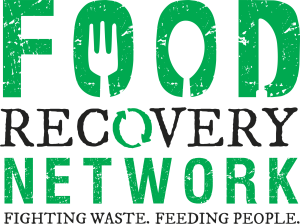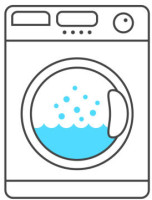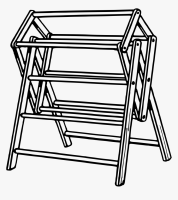Green Living Guide
Find tips for green living below!
Students, before you arrive:
- Only bring/buy what you need: many students over pack and end up buying/bringing clothes and items they’ll never use.
- Not everything has to be new: reuse your high school backpack and dishware, towels, and bedding from home.
- Research your new living space: find the dimensions of your dorm on Purchase’s website under “Building and Room Information.” This can help you determine what items you’ll have room for, and you’ll save money by downsizing and avoiding over-buying.
- New-to-you: promote a circular economy by buying items for school from thrift stores. With the rise of online thrift stores, buying secondhand has never been easier or more accessible—your wallet and environment will thank you.
- Water bottles: Bring a reusable water bottle with you. Hydration stations are located throughout campus and can be found on this map. Water pitchers and filters are also great for reducing single-use plastic waste. With a reusable bottle and pitcher, you’ll save money and prevent thousands of water bottles from ending up in the landfill.
When you’re here:
Laundry:
- Most of the energy used for a load of laundry goes to heating the water—washing your clothes with cold water not only saves energy and money, but your clothes will last longer, too.
- Do fewer larger loads instead of multiple smaller loads
- Buy a drying rack and skip using the dryer—it’s better for your clothes and you’ll help save energy. Most drying racks fold down very compactly, so when you’re not using them, they won’t take up a lot of space and can be stored easily.
In your dorm/apartment:
- Turn off all lights when you leave
- Unplug all chords from wall outlets when not in use to avoid consuming ghost electricity
- Turn off the faucet when you brush your teeth (I’m sure you’ve heard this one before, but lots of people still do this)
- Buy a water pitcher and filter and store it in your fridge—you’ll have ice cold water whenever you want it and can save up to 300 plastic bottles per filter
- If you don’t already have one, buy a reusable water bottle—you’ll save money and reduce the amount of plastic you consume
Recycling
What can be recycled?
- Metals: rinsed and dry aluminum cans or jars, bronze, tin, copper, and steel
- Mixed paper: any white and mixed office paper including magazines, printer paper, notebook paper, and construction paper
- Cardboard: make sure it’s clean and not contaminated with food or grease; break down the cardboard so it’s flat
- Plastics: #1-7, ensure the plastics are rinsed and clean before you place them in the bin
- Glass: all colored and clear glass, ensure the glass is rinsed and clean before you place them in the bin
- Electronics: batteries and other e-waste; these materials can’t go in the usual bins: fill out a work order for e-waste recycling pick up or go to the basement of the library where the e-waste wooden bin is located
Transportation
- Take the Loop bus—it’s free for anyone with a valid Purchase ID. The Loop travels to White Plains and Port Chester and the schedule can be found on Purchase’s Parking and Transportation website under “Campus Shuttles.”
- Bicycles: bring your bike to campus! Register it for free at the Parking Office and park it at any of the racks on campus. Winter storage is offered through the Office of Residential and Student Life.
Sustainability in Academics
Sustainable Development Goals (SDGs):
- The SDGs are a set of 17 goals that were developed by the United Nations. They are an urgent call to action for all countries to curb the climate crisis and ensure social equity. Purchase College joined the UN Global Coalition in 2021 and included the SDGs into its Learning Outcomes for the 2021-2027 Strategic Plan.
Environmental Studies Major and Minor:
- The environmental studies BA program at Purchase College reflects the interdisciplinary focus on the interactions among the sociopolitical, economic, and ecological systems where the natural world and human society overlap. This new approach offers challenges and opportunities for those motivated to help improve the health of our environment and the quality of human existence.
- The program culminates in the senior project—a research project undertaken in collaboration with a faculty member. Senior research projects vary widely in topic and method, but all incorporate a common theme: environmental impacts cannot be addressed without consideration of human society.
Other Classes:
- The importance of sustainability is highlighted in other majors and minors like Sociology, Anthropology, Gender Studies, Liberal Arts, Global Black Studies, Biology, New Media, and Philosophy.
- Campus Composting Internship
- FreeStore Internship
- Land Stewardship Internship
- Native Plant Garden Internship:
- Zero Waste Internship
Get Involved
Committees:
- The Sustainability, Advisory, and Outreach Committee has 2 student members representing their fellow peers. Anyone is welcome to sit in on the monthly meetings.
- Student Sustainability Coordinator (SSC): This position is through the Purchase Student Government Association (PSGA). The SSC oversees the Green Fee, which is a portion of the mandatory activity fee that all students pay. They can also work with staff, faculty, and students to help implement greener practices at the college. If interested, contact the PSGA President to see if this position is vacant.
- Green Fee Council: The Green Fee Council is the student-run entity that guides the sustainability efforts of the PSGA. The Green Fee Council is chaired by the Student Sustainability Coordinator.
- Civic Actions Committee: The Civic Actions Committee is the entity of the PSGA that focuses on initiatives that better the collective student body while developing common goods to empower the campus community.
Clubs:
- Outdoors Club: Outdoors Club is a group of students who share a passion for getting out in nature! This club consists of trips to nearby hiking destinations such as Bear Mountain, Hudson Highlands, and also beautiful parks within the Westchester area. Join Outdoors Club if you are interested in spending time with cool people and going on hikes!
- Disabled Students’ Union: The Disabled Students’ Union (DSU) aims to provide a safer space and community for disabled students/students with disabilities on campus (allies are welcome too). DSU focuses on educating and advocating the community on issues and causes that affect the disabled community.
- LGBTQU: Founded in 1972, the Lesbian Gay Bisexual Transgender Queer/Questioning Union has existed at SUNY Purchase College, under many names, since the college’s inception. They are one of the oldest student organization on campus and the first & largest LGBTQ+ student union in New York State. The LGBTQU aims to educate our campus community on LGBTQ+ issues, advocate on behalf of students, and to support students who are coming to terms with, questioning, or curious about all things pertaining to our community.
- NYPIRG (New York Public Interest Group): The LGBTQU aims to educate our campus community on LGBTQ+ issues, advocate on behalf of students, and to support students who are coming to terms with, questioning, or curious about all things pertaining to our community. The issues we work on are: Higher Education Affordability and Accessibility; Hunger Prevention; Environmental Protection; Consumer Protection; and Voter Mobilization/Voting Rights. The internship is open to students of all majors.
- Club meeting times and scheduled events can be found on PantherLink.
Second Chances
- Food Recovery Network (FRN): Statistics show that 1 in 6 Americans face food insecurity, while 40% of food is wasted and sent to landfills. Our FRN chapter, a student-led program, seeks to fight food waste AND hunger by recovering perishable food from on-campus dining locations that would otherwise go to waste. Some foods can include prepared dishes/meals, pre-packaged sandwiches, produce, baked goods, etc. After on-campus events, left over food is recovered and stored in a communal refrigerator that any campus community member may access.

- FreeStore: This is our free on-campus thrift store. Students can drop off unwanted clothing and small household items and pick up items that other people have donated.

- FreeNew: At the end of each spring semester, the FreeNew sheds are opened and unwanted pieces of dorm furniture and other items can be placed inside. The items are stored in the sheds for the remainder of the semester and are opened again at the beginning of the following fall semester. Everything is free.


